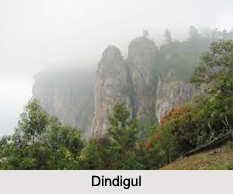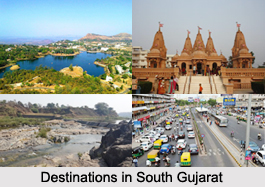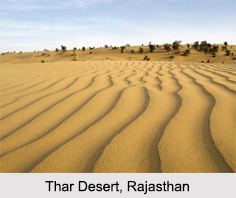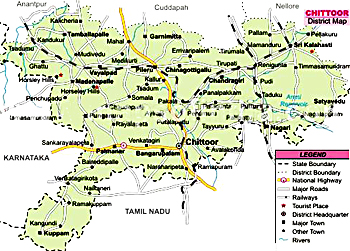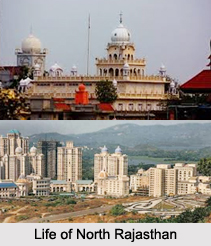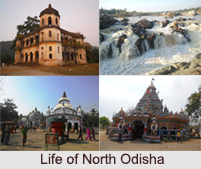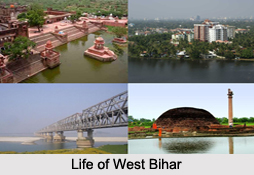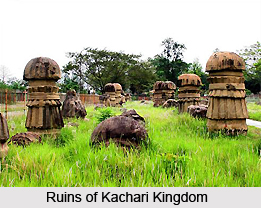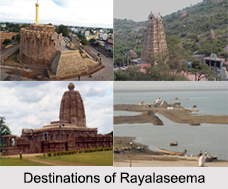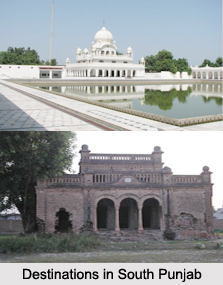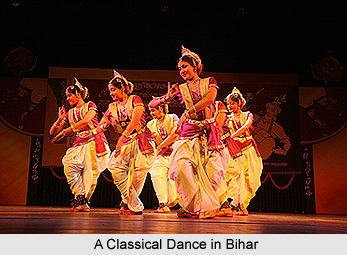 Bihar is situated adjacent to West Bengal . It is one of the important states of Eastern India. Fertile soils, flow of mighty rivers, rich flora and fauna are the identifiable traits of the region and all aids in elevating the already rich culture of Bihar. It is the birthplace of Gautama Buddha and King Asoka , thus hinting to the enriching past and its cultural heritage. Nalanda, Bodh Gaya, Vaishali are the favourite tourist spots frequented by a number of pilgrims and tourists through out the year.
Bihar is situated adjacent to West Bengal . It is one of the important states of Eastern India. Fertile soils, flow of mighty rivers, rich flora and fauna are the identifiable traits of the region and all aids in elevating the already rich culture of Bihar. It is the birthplace of Gautama Buddha and King Asoka , thus hinting to the enriching past and its cultural heritage. Nalanda, Bodh Gaya, Vaishali are the favourite tourist spots frequented by a number of pilgrims and tourists through out the year.
Festivals of Bihar
Festivals are inherent part of the Bihari lifestyle. It is an indispensable part of the culture of Bihar. The festivals like Goddess Saraswati Puja, Holi, Eid-ul-Fitr, Eid-ul-Adha ,Muharram, Rath yatra, Rakhi, Maha Shivaratri, Durga Puja,Diwali, Goddess Lakshmi Puja, Christmas, Mahavir Jayanti, Buddha Purnima, that are celebrated throughout India are observed here also. Besides, there are few unique festivals for the local people. One of these is the festival of Chhath Puja. Chhath, or Dala Chhath and is feted twice a year. It is the worship of Sun God The Chaiti Chhath is celebrated during sultry summer of March.
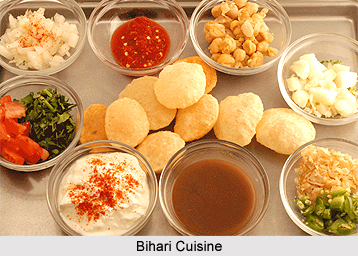 Chhath is one of the main festivals of and all Biharis and definitely plays a great role in ameliorating the ethnic culture of Bihar. It is celebrated it with great reverence and faith. Women keep fast for the welfare of the family and folk songs and dance are an integral part of it. Sama Chakeva is the celebration of welcoming migratory birds from the Himalaya Mountains. It is celebrated in the chilly winter season, especially in the Mithila region. It is the celebration of sibling relationship. The sisters prepare decorative clay toys of birds. Numerous rites are observed the celebration ends with hope that the birds would come back the subsequent year. Makar Sankranti, popularly known as Tila Sankranti is feted as the arrival of sultry summer. Bihula festival celebrates the worship of "Mansa deity". Mansa is worshipped for family`s well being. It is a popular festival particularly in the district of Bhagalpur of Eastern Bihar. In the Mithila region, Madhushravani is observed during Sawan, the season of rain Hindu calendar.
Chhath is one of the main festivals of and all Biharis and definitely plays a great role in ameliorating the ethnic culture of Bihar. It is celebrated it with great reverence and faith. Women keep fast for the welfare of the family and folk songs and dance are an integral part of it. Sama Chakeva is the celebration of welcoming migratory birds from the Himalaya Mountains. It is celebrated in the chilly winter season, especially in the Mithila region. It is the celebration of sibling relationship. The sisters prepare decorative clay toys of birds. Numerous rites are observed the celebration ends with hope that the birds would come back the subsequent year. Makar Sankranti, popularly known as Tila Sankranti is feted as the arrival of sultry summer. Bihula festival celebrates the worship of "Mansa deity". Mansa is worshipped for family`s well being. It is a popular festival particularly in the district of Bhagalpur of Eastern Bihar. In the Mithila region, Madhushravani is observed during Sawan, the season of rain Hindu calendar.
Chitragupta Puja and other local festivals are observed with excitement in the state. The people of few cities of Bihar, namely Sultanganj and Deoghar District, orchestrated Shravan Mela and it was held annually, in the month of Shravan (as per the Hindu calender). of Anga region also. Another popular festival of Bihar, especially in Anga region, is Bihula-Bishari Puja.
Music and Dance of Bihar
Song and dance is an important part of any culture, and Bihar is rich in both. The culture of Bihar is therefore an amalgamation of rich music, pulsating folks and popular dance forms. Hindusthani classical music is in vogue; numerous folk songs are hummed in various occasions. `Sohar` sung during the birth of child, Sumangali is a wedding song. Katnigeet and Ropnigeet are related to paddy reaping, Katnigeet was performed when the paddy was sowed in, while the latter is performed during full harvest. There are group songs whistled by Roshan Chouki, Bhajaniya, Kirtaniya, Pamaria and Bhakliya in the gatherings and special functions. Musical instruments like Tabla, Dholak, Harmonium and Bansuri, are used once in a while. Biharis are fun loving and special Holi songs, popularly known as `Phagua` were composed by them. However, in the era of British imperialism of 19th century, the people of Bihar composed several melancholic songs depicting the sorrows and problems that were inflicted on these hapless people by the Britons. The war songs called Beer Kunwar are well appreciated by the populace.
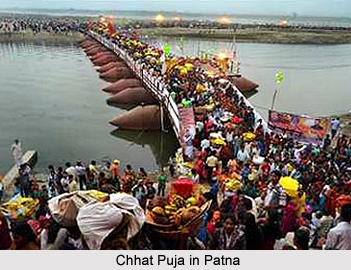 Biharis have proved their creativity in the performance of folk dancing. Numerous dance styles namely gond nach, dhobi nach, jhumarnach, manjhi, jitiyanach, more morni, kathghorwa nach, jat jatin, launda nach, bamar nach, jharni, jhijhia, natua nach, bidapad nach, sohrai nach. Originally, Chhau, a war dance of Bihar, is executed to ameliorate fighting skills. However in the latter days it had adopted the techniques of a ballad.
Biharis have proved their creativity in the performance of folk dancing. Numerous dance styles namely gond nach, dhobi nach, jhumarnach, manjhi, jitiyanach, more morni, kathghorwa nach, jat jatin, launda nach, bamar nach, jharni, jhijhia, natua nach, bidapad nach, sohrai nach. Originally, Chhau, a war dance of Bihar, is executed to ameliorate fighting skills. However in the latter days it had adopted the techniques of a ballad.
Cuisine of Bihar
The oriental culture of Bihar has made its presence felt in the style and trend of Bihari cuisines. Biharis are mainly veggies and also developed tastes for non- vegetarian meals. Unlike Brahmins of other Indian states, Bihari Brahmins, especially of Maithili regions, love to eat fish. Kayasthas, however, used to avoid non- vegetarian items.
Rice, pickes, dal, roti, vegetables are staple foods for Biharis. In spite of being a land of mighty rivers, fish is not relished by the people. Chicken and eggs too are not included in their meals. Religious practices of Biharis have created their orientation towards veg meals. The Biharis are experts in bringing variation to the humdrum vegetable meals. Everyday they cook six kinds of vegetable food items with individual meal. There are almost 500 varieties of homemade pickles that are prepared by the women. A favourite snack, `Jhal moori`, is prepared of `puffed rice`, adding `sprouts` and other ingredients. Shoved `parotha` is also very yummy to eat. ` Khichdi` is served with `chutney`, `padas`, `dahi` and pickles. In Bihar, `Kadhi` is consumed with `pakora`. Sumptuous food is dished out in with various ingredients like coriander leaves, beet root, and carrot, vegetables seasoned during winter, cabbage, raw peas, onions, tomatoes, and cucumber. Thick curd, prepared by boiling milk is a hot -favourite to the people.
To the people of other regions of India, Sattu has become a trade mark of Bihar. It is foodstuff made from deep-fried grams. The rural folks of Bihar eat `doughed sattu` with pickles and pinch of salt. Dishes namely `Sattu ki Roti`, ` litti` are cooked with it.
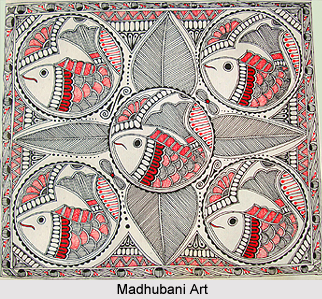 Lifestyle of Bihar
Lifestyle of Bihar
The identity of a region can be denoted by the locales and the unique lifestyle that they have adopted. Since Bihar is always thronged with tourists and pilgrims legion hotels are built up; Bodhgaya Ashok, Royal Residency, Patiluputra Ashok, Hotel Samrat International are some popular names in hospitality industry of the region. They provide every amenity to its customers and induce an idealistic abode for their enjoyment. The orthodox Bihari community is not acquainted with the licentious nightlife.
Entertainment of Bihar
Truly the Biharis are movie- buffs. They endeared the movies made in Bhojpuri language Bihar has a robust Bhojpuri cinema industry, granting a flavor of rich ethnicity of the state of Bihar. Ganga Maiya Tohe Piyari Chadaibois the first film made in Bhojpuri language and until now, Nadiya Ke Par is the most famed Bhojpuri film. There is also the existence of Maithili film industry, which has flourished and still is in its nascent stage. Kanyadan was the first Maithili Film. It was brought out in 1965 and Phani Majumdar was its director. To the people of Bihar, these movies made in regional Bihari languages sell like hot cakes. Recently, a film named ` Khagaria Vali Bhouji` was made in Angika language which is widely spoken by Biharis. Most of the famous Hindi filmmakers had incorporated the Angika language in their dialogues. Parinita(Old), Gangajal (Produced by Prakash Jha), Tisri Kasam are some examples.
No one can deny that theatre is an integral part of lifestyle of the people in Bihar. Popular theatres of Bihar like Reshma-Chuharmal, Bihula-Bisahari, Bahura-Gorin, Raja Salhesh had its origination in Anga region. Bidesia is a popular category of dance play is Bidesia and it is a favorite of all Bhojpuri people.
Art and Craft of Bihar
It is the home of Madhubani Art and Angika Art. Originated for Mithila region it had a robust tradition of wall paintings. Bihari women folk draw the paintings with the help of dyestuffs made from vegetables. Scenes of countryside, animal and human world, Indian deities are beautifully painted and Maithal paintings are d‚cor of residential houses of the people both in India and abroad. Patna Qalam, an offshoot of Mughal Miniature School of Painting, regained its stature of high quality art by the artists of Patna city. Silk Industry especially Tussar silks, is boom in Bhagalpur region of Bihar. They produce silk thread and weave them into marvelous artworks, thus making Bhagalpur one of the most proficient silk manufacturing centers. Due to its proximity the culture of Bihar shares quite similar traits with its neighboring states of West Bengal. Although it has commonness with Bengalis and Oriyas, Bihar, successfully, curves out its niche in terms of the manifestation of its culture and tradition.







